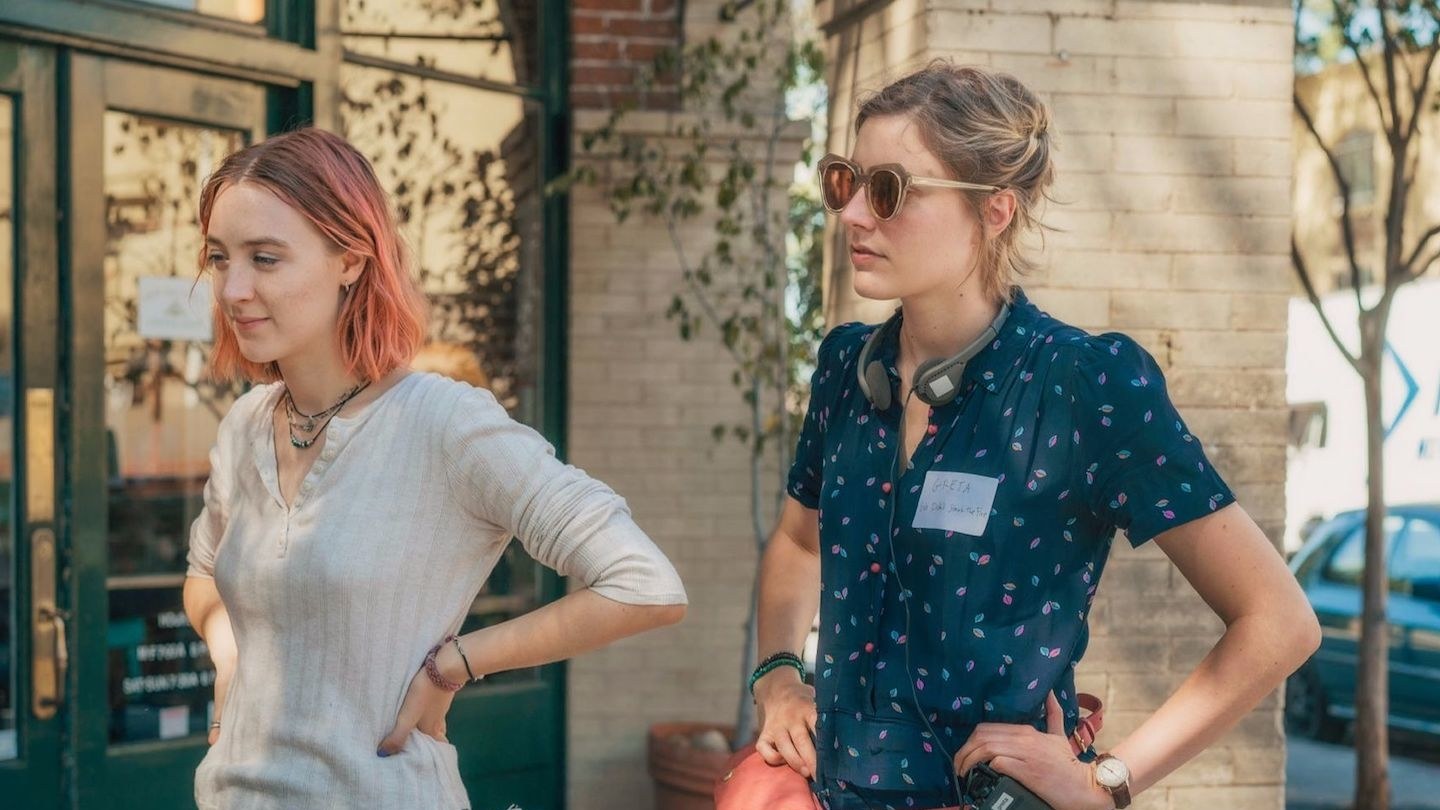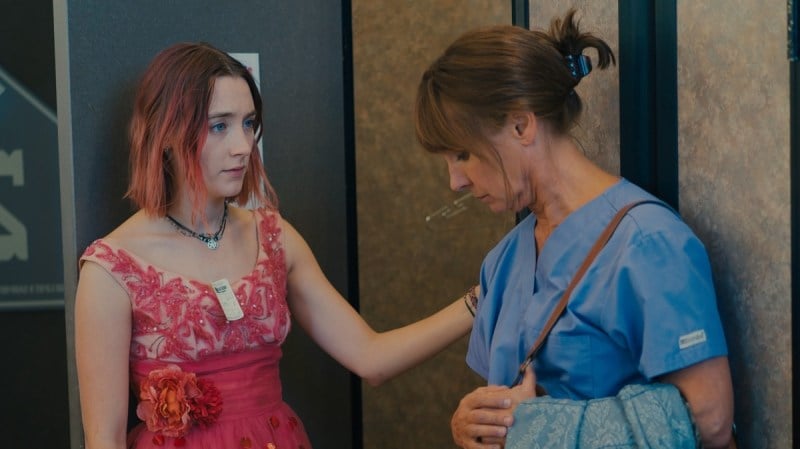The richly observed “Lady Bird” by Greta Gerwig is not a filmmaker’s debut. Gerwig has been honing her skills for years through her Noah Baumbach work (“Mistress America,” “Frances Ha”), about spunky twenty-somethings with nowhere to go. Now, she has made a film (her official solo directorial debut) which is stabler and less fancy-free than Baumbach’s screwballs — with an even more miraculous grasp on people.
Saoirse Ronan (who can play no wrong) is Christine “Lady Bird” McPherson, a Catholic high-school senior from Sacramento who is navigating a vicious non-relationship with her mother, a rocky college app process, a messy love life and lower-middle blues. Like her father (Tracy Letts), she’s pretty lonely; the distance she cultivates between herself and her mother and two key best friends (Lucas Hedges, Beanie Feldstein) is the film’s central strain. Ronan and Gerwig conspire to bring out Lady Bird’s flash yet vulnerability through scenes which mix emotions so intricately it hurts to recall them:
(1) Ronan’s/Lady Bird’s innocent, hoarse voice when she tells her maybe-boyfriend (Timothée Chalamet): “We deflowered each other — we have each other’s flowers” — with a delivery that is both deeply funny and deeply melancholic.
(2) The half-New Orleans-jazz rhythm of Lady Bird’s arguments with her mother (Laurie Metcalf), where each woman has a valid point and speaks her mind over the other’s, only concerned about her own solo righteousness — understandable yet tough to hear, because their vengeful back-and-forth rolls off their tongues so chillingly naturally.
Gerwig makes the most relatable American film of the season because her vision is based in daring interiority. A skill mostly de-valued in popular movies today (as seen in most politically-minded middlebrow cinema with very few satisfying returns, from the sanctimonious and talky “Three Billboards” to the irresponsibly hollow spectacle of “Dunkirk”) is soft character shading: Drawing the outlines of people from a place deep inside one’s self, with no concern for how it looks to an outside spectator. The goal (as it is with Charles Burnett, John Cassavetes, Satyajit Ray, Kelly Reichardt, Jean Renoir, et al.) is to continually search for the essence of the people one knows, positing a person’s raw individuality and flawed nature as the end of the artist’s search (which obviously never ends).
Gerwig works with a similar love-of-people: Is this true to my own self, to my own understanding of truth? She proves detail, patience and accuracy are all virtues. She is generous with her actors, boasting (along with the “Florida Project” players — different mode-of-attack, same attitude) this year’s tautest ensemble. Each person has a moment to rise then recede in and out of the shimmering, washed-out background of a collective memory.

Gerwig’s plan is to bundle together the loosely connected shards of Lady Bird’s life and squeeze them into 90 minutes where we are overwhelmed by the level of attention (=love) given a completely de-sensationalized crew of Central Valley Catholics. This ersatz cataloging results in a de-centered narrative, where we are in a lot of places at the same time. Gerwig’s dexterous give-and-take is reflected in her and editor Nick Houy’s sharp sense of timing. There are two stellar long takes which come to mind: Lucas Hedges makes a desperate plea to Saoirse Ronan, and Laurie Metcalf drives away from an airport in a car. The emotional content of both scenes is already huge (one is a boy coming out, the other is a mother snubbing her daughter and slowly regretting it), but they gain tremendously by the Kelly Reichardt-like length of time Gerwig chooses to hold the take, refusing to cut just when we think we’ve understood the scene. This waiting — where we are allowed to stew with Ronan’s/Hedges’ and Metcalf’s mixed-up emotions — goes in the opposite direction of the typical popular independent film, which always feels the annoying need to say something profound and timely every 3 minutes.
One of the most disturbing of the happy-sad “Lady Bird” heroes is the big-lug Father Leviatch played by Stephen McKinley Henderson. In an acting exercise where he challenges his students to cry, he’s (hilariously yet sadly) the first one to succeed. Later, he’s upset when people don’t “understand” his adaptation of the musical “Merrily We Roll Along.” Gerwig’s brilliance is her sinuous, Wellesian long-take where she tracks away from one major plotline (Julie’s silent pain when her dream-teacher will never feel anything for her) and, in the same shot, picks up the devastated Henderson in a seemingly minor plotline. This single camera movement by Gerwig reveals everything about her generosity of heart: In her eyes, Julie’s and Leviatch’s quiet devastation should be given the same amount of attention. You don’t know what events make people feel the way they do. They may be comic to you, but of the utmost inner turmoil to me — how would you know? The next and final time we see Fr. Leviatch is when he meets with Laurie Metcalf. It’s to discuss his depression. “Please don’t tell your daughter about this,” he says with a nervous, embarrassed pain in his eyes.
As the cute, bashful, respectful first crush of Lady Bird, Lucas Hedges under Gerwig’s direction is expansive in a way that he is not in “Three Billboards” or “Maximalism by the Sea.” Pay attention to what he whispers when he runs into the McPherson family at a post-graduation dinner celebration: “I miss you guys.” The line is barely emphasized, but it conveys everything about the melancholic drift of his character. How did his story shape up after his big revelation? We can’t say for sure, but we know it wasn’t an optimistic “Edge of Seventeen” ending where two kids make up. Gerwig is less assuaging. With the Hedges and Henderson characters, Gerwig, who can’t be everywhere at once and knows it, does the next best thing: Suggest a life of resolute sadness in as few gestures and words as possible.
If there’s one person that consistently stands out from the pack, it’s Laurie Metcalf as Lady Bird’s mother Marion. She is taking on an impossible task: Navigating a relationship with a daughter who is so ashamed and disgusted with her family’s class that she refuses to have friends over. Theirs is like the chicken-or-egg of mother-daughter contempt. Each woman has her own reasons, you can’t tell who was to blame for any given situation, but they each keep up a nastiness to each other that is hilarious, cringe-worthy and real. The final airport scene is completely Metcalf’s, the heart of “Lady Bird.” What I will never forget, what will always haunt me, is the manically hopeful grin on Metcalf’s face when she thinks she’ll be back in time to say goodbye to her daughter. She goes through so many emotions, and lands with only one: A profound failure, temporary, but whose memory her daughter will surely never forget. Metcalf is always dry and ungiving and tense, but with a boundless love — one that Lady Bird/Christine will recognize once she’s older, much older. Metcalf is exactly “warm and scary,” as Lucas Hedges says.
“Lady Bird” is a deftly drawn and delicate vision of a woman’s childhood. It is non-judgmental in a completely clear-eyed way. And it has internalized emotion so well that we feel purposely mixed up. We don’t know whether to cringe, chuckle or cry during a scene, so Gerwig suggests we do all three.
“Lady Bird” plays at the Guild in Menlo Park and the Cinemark 20 in Redwood City.
Contact Carlos Valladares at cvall96 ‘at’ stanford.edu.
